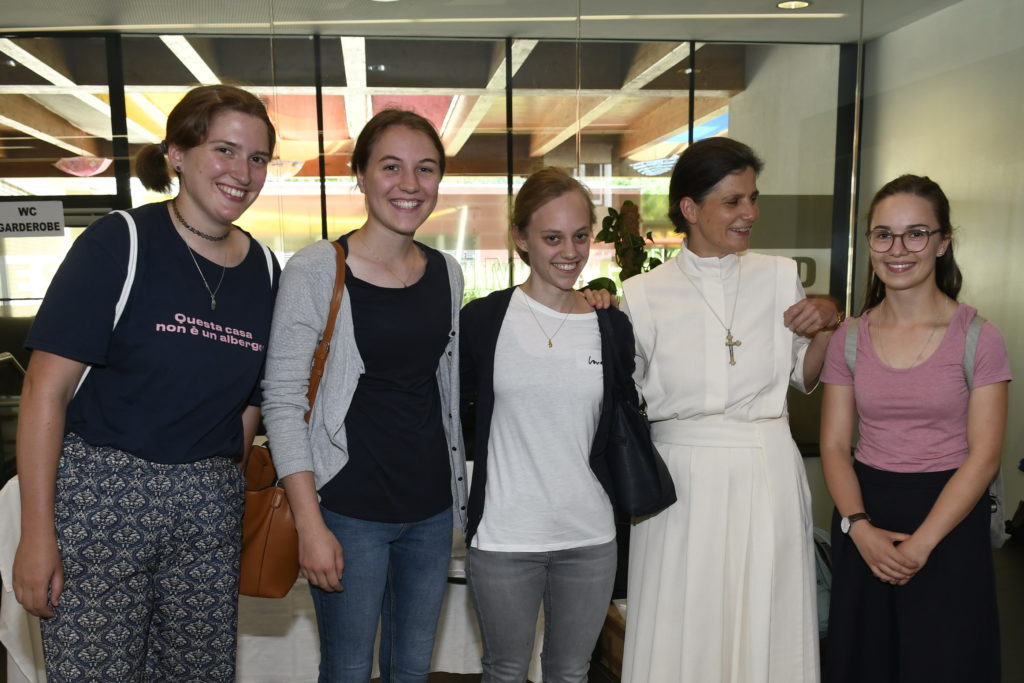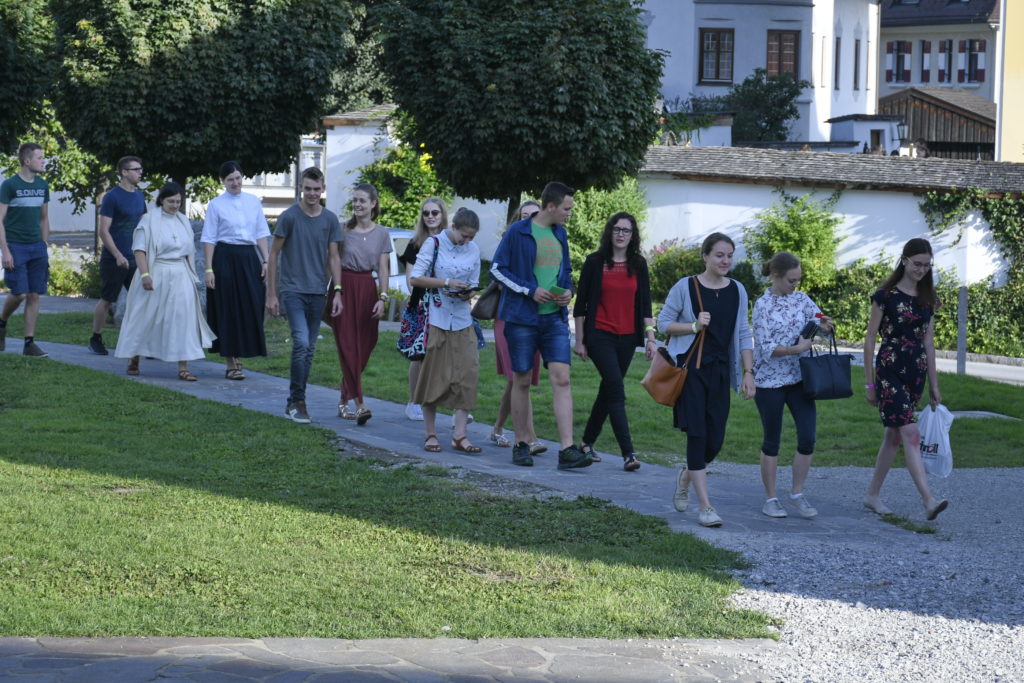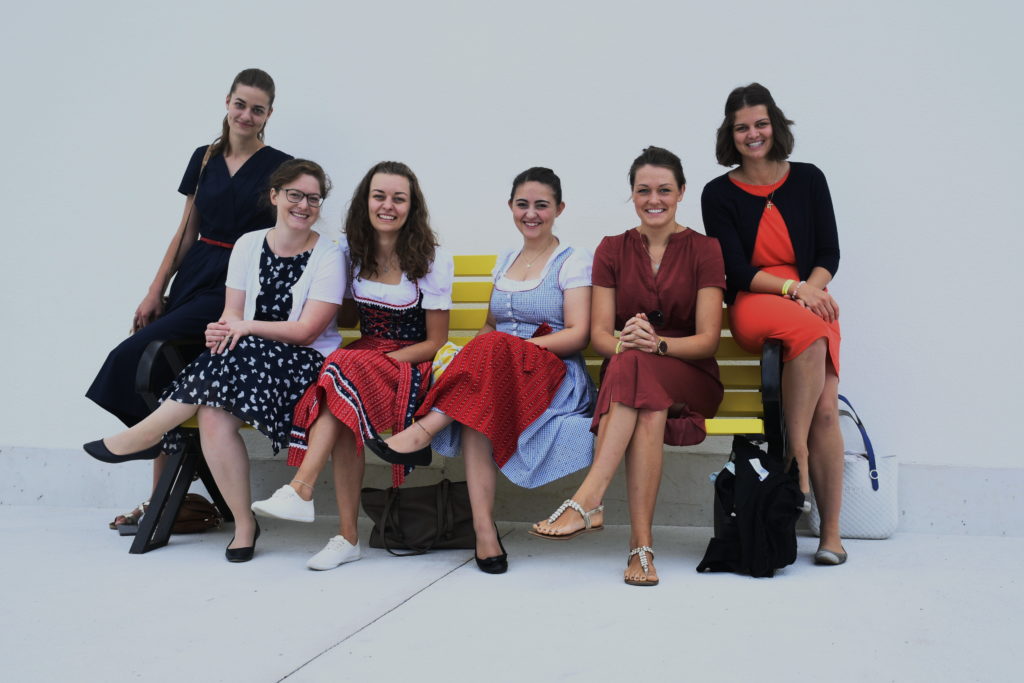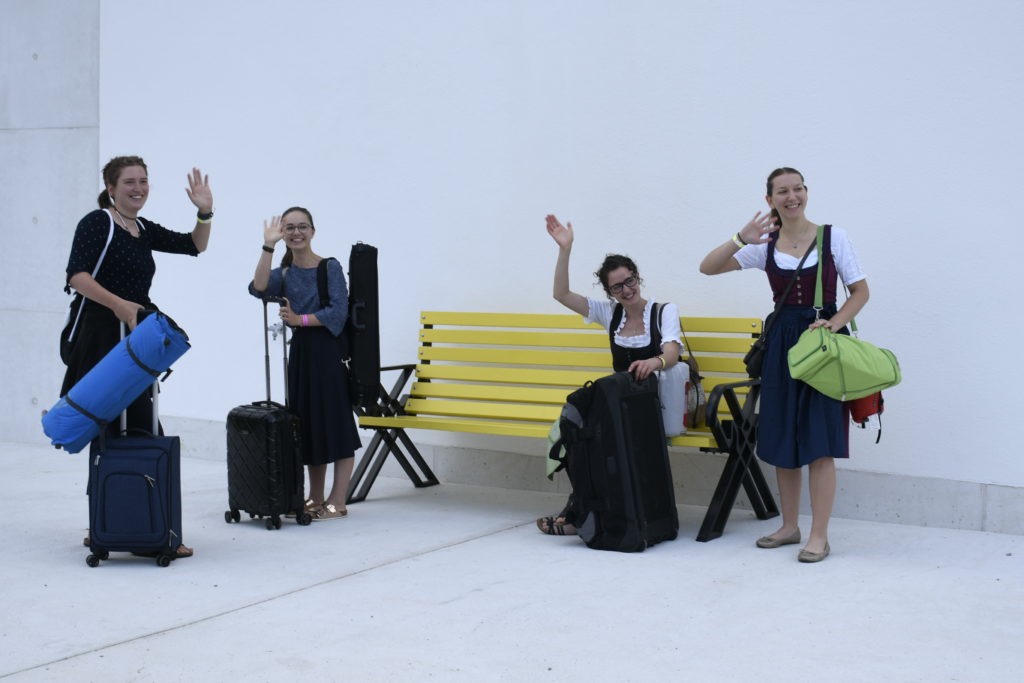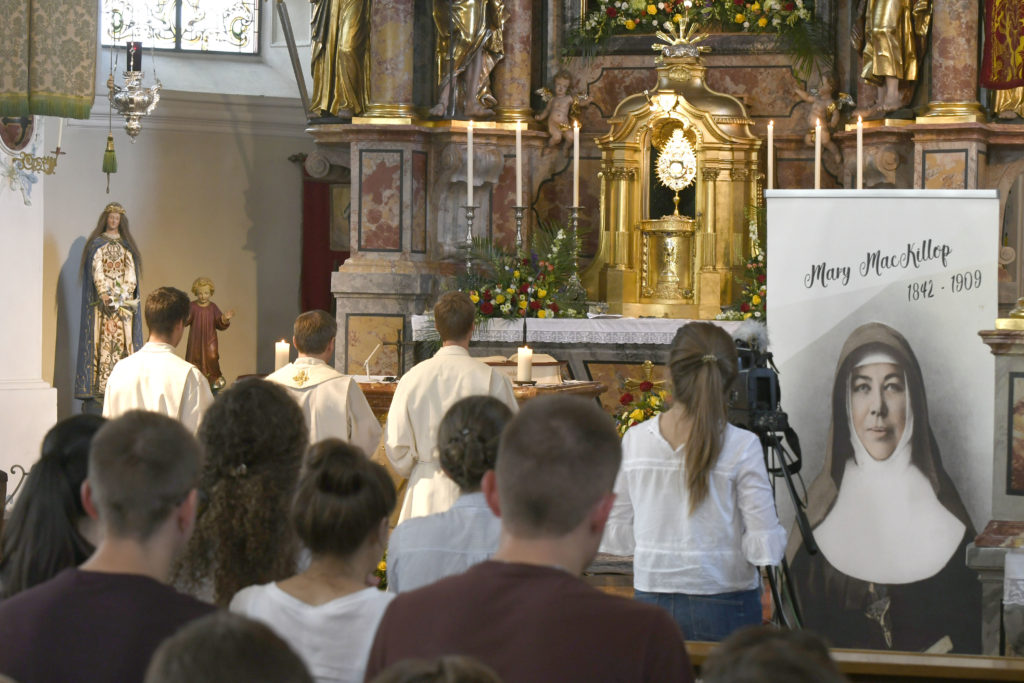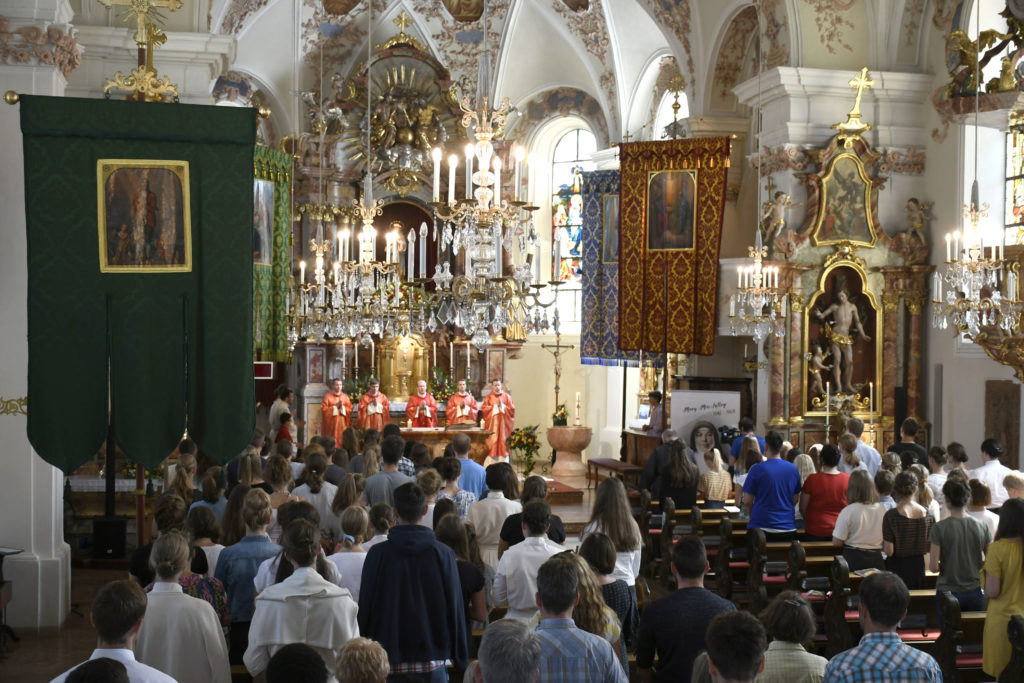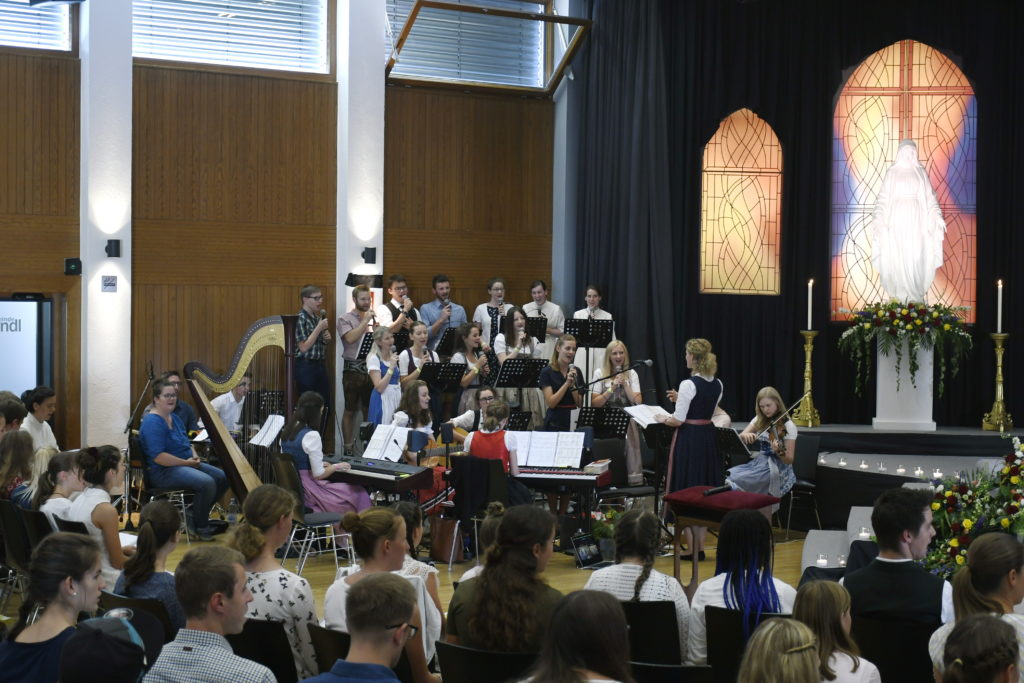The 27th General Chapter of the Sisters of Saint Joseph
October 7, 2019The 27th General Chapter of the Sisters of Saint Joseph is underway at St Joseph’s Conference Centre at Baulkham Hills, Sydney.
The 63 Chapter members, voted as delegates by the Sisters in their Regions, are involved in discerning the future of the Congregation and will elect a new Congregational Leader and Councillors. All the Sisters and some of their affiliates have been engaged in a year-long process of prayer, reading, reflection and contemplative dialogue in preparation for this event.
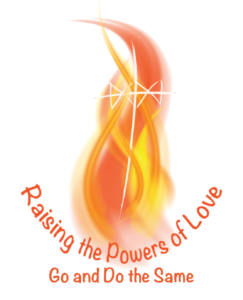 The theme of the Chapter is Raising the Powers of Love, taken from Teilhard de Chardin’s insights. The Chapter gospel story is the parable of the Good Samaritan.
The theme of the Chapter is Raising the Powers of Love, taken from Teilhard de Chardin’s insights. The Chapter gospel story is the parable of the Good Samaritan.
Facilitator Judith King explained Chapter as: “a way of dreaming, a way of thinking, a way of organising, a way of keeping true to the Gospel – a journey of faith and prayer, a discernment.”
Women and men with various relationships to the Sisters visited the Chapter and spoke about how they were influenced by the charism in their work, and offered challenges that the Chapter could consider.
Clyde Rigney, a Ngarrindjeri Elder, travelled from South Australia to address the Chapter. Others represented organisations such as Mary MacKillop Today, Global Catholic Climate Movement, Josephite Heritage Centres, and Australian Plenary Council 2020.
They spoke of their connection to the charism in the places they worked – in schools, as young adults involved in social justice, in running a social service organisation, being a Josephite affiliate leading the chaplaincy team in a large hospital, and as a Josephite Associate/Companion. They encouraged Sisters to trust them as partners in living the charism.
The flow of messages of prayer and support has greatly encouraged the Chapter members. The Chapter is supported by an enthusiastic group assisting with prayer, health and well-being, hospitality, minute taking, translating and communications.
Anne Burke rsj
View some photos from Chapter in the gallery below:
Pray with the Sisters for their 27th General Chapter
Fr Julian: Man of Words – Letter Nine

130 years ago, on 7 October 1889 Father Julian Tenison Woods died at 561 Elizabeth Street, Sydney. He was only 56 years old. This month we provide opportunity to explore some of the articles that appeared in newspapers across Australia at that time.
A SOLEMN DIRGE and REQUIEM MASS for the REPOSE of the SOUL of the Late Very Rev J E TENISON-WOODS will be celebrated at St Mary’s Cathedral, TO-DAY at 10am. The funeral cortege will leave the Cathedral for the Waverley Cemetery at 2 pm. [ii]
These are the simple death and funeral notices that appeared in Sydney newspapers following the death of Father Julian Tenison Woods. Subsequently, newspapers all over Australia noted his passing and extolled his virtues.
Death of Fr Julian Tenison Woods
Anniversary of the Death of Fr Julian Tenison Woods on 7 October.
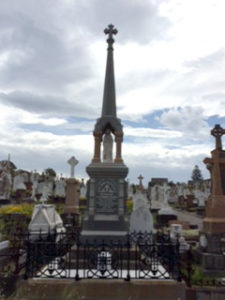
We commemorate the 130th anniversary of the death of Julian Tenison Woods on 7 October. A multi-faceted human being with extraordinary gifts and talents in a variety of fields, his scientific exploration and writings demonstrate his profound appreciation of nature and challenge us to reverence creation. While he was well regarded in the scientific world, he was beset by many personal disappointments and misunderstandings within the church. He was not a saint, but through his suffering, he remained constant in his faith and committed to his priesthood.
We invited Tenison Woods College students in Mount Gambier, SA to produce a video to celebrate this wonderful man – please view at the end of this article.
Friendship
October 6, 2019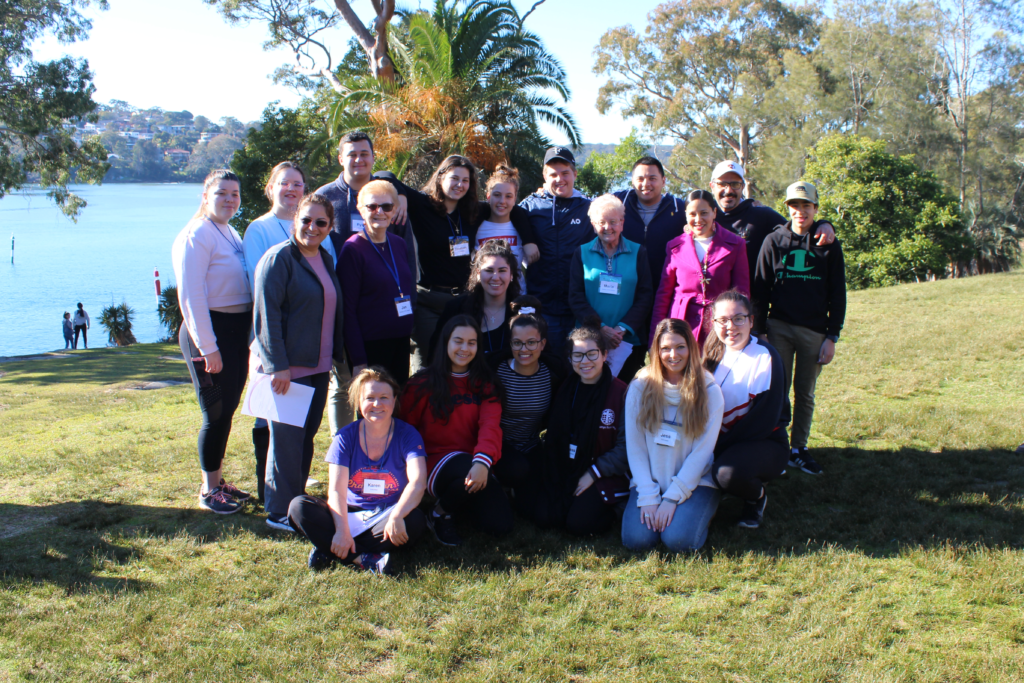
When your intent is friendship, the humble Aussie sausage will suffice…
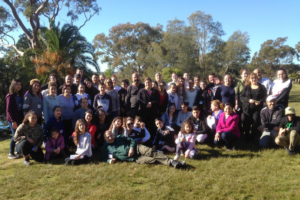
Recently our young JAG (Josephite Action Group) volunteers had a feast with a group of newly arrived refugee families. We were offered different types of Kibbu, Tabouli, Kouba, salad options, homemade Turkish delight, sesame bars made from a grandmother’s secret recipe, homemade baklava, dulma and biryani chicken rice. It was magnificent and more delicious because it was made with love. Such a feast put our Aussie sausage BBQ to shame – but our offering during our time together at the Royal National Park (South of Sydney, New South Wales) was an offering made in friendship and love also.
Many newly arrived refugee families from Iraq have daughters attending Mary MacKillop College at Wakeley. Over time it had become apparent that many of these newly arrived refugee families feel isolated. Our young JAG volunteers resolved to host our new friends to a weekend away at the Royal National Park. This would be an opportunity to deepen our acquaintance, learn from each other and share stories, meals, games and culture.
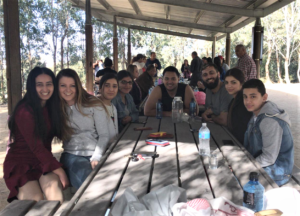
We went bushwalking, we played games, we sang and danced, we went rock climbing, catapulting, billy cart driving and exploring. Outside experts offered educational opportunities to the adults for work potential. It was a cultural exchange opening our eyes to the difficulties faced by war- traumatized people arriving in Australia. All our new friends have left everything to make a new life – one that is safe for their children. Many have been forced to abandon their professional, successful careers to start afresh in Australia. It is remarkable for people to have given up so much and yet elect to be hopeful and optimistic about their futures.
The JAG volunteers used the weekend as an opportunity to nurture friendships with our new Australians and devise a way forward working with these families to create more opportunities for them in their new country, Australia. As Aussie tradition would dictate, our meal offerings consisted of sausages and meat BBQ, tomato sauce, salad and bread. All eagerly consumed by both volunteers and families. The weekend was a huge success with a resolution made to reunite for an Iraqi picnic.
Two weeks later and it was our Iraqi families’ time to host us at Lizard Log Park at Chipping Norton, New South Wales. Their food offerings were slightly more elaborate than a sausage on a roll and enthusiastically consumed by all JAG volunteers. We took up three lots of two-metre tables covered in the traditional Iraqi food listed above. The picnic was a huge success.
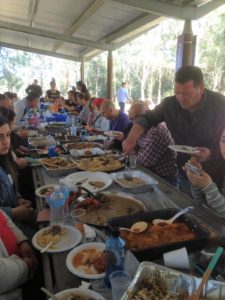
It is said that sharing a meal is an important act for community development. Jesus chose to share a supper with his best friends before leaving them. In that breaking of bread, that sharing, we come together as one community willing to learn from each other, laugh with each other and help each other. The Spirit was with Jesus as he broke bread. The Spirit was with us as we forged new friendships with our Iraqi families. And yes, their meal offerings were slightly more elaborate than a sausage roll, but both offerings were equivalent when the motive was love and lasting friendship.
A special thanks must go to Mary MacKillop Today for the grant provided in order to begin this life-long project of friendship
Karen Oxley
Volunteers Co-ordinator
Josephite Justice Network
World Teachers’ Day 2019
October 5, 2019If I was Premier for this year’s ‘World Teachers’ Day’ I would hang special banners from the Harbour Bridge and Parliament House.

These banners would show a teacher drawing material from another period or place which they would be unravelling with the help of several children and young people who in turn would be forming their own shapes. The learning process thus represented has teachers drawing on their knowledge of the past or present; they then place their foot in the world of their students and translate this knowledge into the students’ context and language. This requires suitable method and appropriate language so that together in an atmosphere of trust, problems can be solved, and creations developed for today and tomorrow.
I must state my bias in writing this article. I am a teacher. I love and respect and am challenged by this role. I still have on-going relationships with some students I taught more than 50 years ago. I have taught every class from Year 3 Primary to Senior Secondary where I revelled in Maths Science and Religion. I also taught at University in Pre-Service Teaching courses as well as Postgraduate Courses and supervision of Doctoral Students. All of this involved me in much discussion of the role of teachers and their issues at all levels that were continually changing and which I followed up from an academic point of view in research.
The teacher always needs to be conscious of the student’s response to the learning process. I found I needed to watch the eyes of my students, especially in Maths, any lack of understanding or interest would immediately show there. I often needed to find a new way to focus their attention and sometimes take them along a different pathway, if my first approach didn’t reflect any awareness or enthusiasm.
I was very lucky I taught at a time when I knew and was trusted by my students and their parents and was indeed supported by them. I am very angry and concerned when I read about teachers today being attacked physically by their students or suffering from forms of anxiety attacks or mental illness, because of the growing stress of the classroom, or the behavior of the students, the lack of support of the parents, or even the administration of the School. The media seems to speak so negatively about teachers in terms of their ability and indeed their value. A teacher’s salary doesn’t suggest to the next generation it is a valued field of employment. I am not saying all teachers are perfect, but I have seen many dedicated young teachers give up their career within a few years and I know students and society are the losers when this happens.
I had the privilege over many years of serving on Syllabus Committees for both Science and Religion Studies and thus worked with so many skilled, creative and committed teachers. It is of the essence of good teachers that they will share their ideas and experience with others as they try to create a framework for teachers and students to use. Teachers are good organisers and able to plan and to see various ways to approach issues with an open mind. It is appropriate that on this World Teachers’ Day we may recall a Teacher who helped/challenged us or our children and, if possible, acknowledge them and encourage a new generation of teachers.
Pat Malone rsj
Image: Photograph with thanks to Mount St Joseph Milperra, NSW. Used with permission.
Social Justice Sunday 2019
September 29, 2019The concept ‘Social Justice’ is very wide, including all societies everywhere, and indeed all creatures and our planet.
 We are increasingly aware of this global reach of social justice, depending as we all are, on how we treat our common home, as well as one another. In this age of fast-growing technology, we have more opportunity than ever before, to know how our actions and the actions of communities, states and nations are affecting others, and the oppressive conditions in which many people have to eke out an existence. Through a multitude of media devices, we are often brought face to face with the truth that the poor are carrying burdens made heavier, by the life style of those who have far more than they need. The world is an uneven and for some, a very unfair place.
We are increasingly aware of this global reach of social justice, depending as we all are, on how we treat our common home, as well as one another. In this age of fast-growing technology, we have more opportunity than ever before, to know how our actions and the actions of communities, states and nations are affecting others, and the oppressive conditions in which many people have to eke out an existence. Through a multitude of media devices, we are often brought face to face with the truth that the poor are carrying burdens made heavier, by the life style of those who have far more than they need. The world is an uneven and for some, a very unfair place.
Whether it is the plight of asylum seekers, homeless people, abused children, low lying islands already feeling the destructive effects of climate change, families too poor to send their children to school, whole groups desperate in the face of starvation, the millions fleeing from war, the unemployed and underemployed who can’t afford to buy a home, prisoners who are wrongly convicted, families whose breadwinner is in gaol, farmers living with the anxiety of drought, women living with domestic violence, trafficked women and men… our hearts are moved to compassion. We want so much to be of help, only to feel a sense of helplessness.
In the words of the 26th Josephite General Chapter 2013, we feel ‘the desolation in ourselves and beyond, we hear the cry of earth, the cry of children’.

Whenever and wherever a measure of social justice has been achieved, to right wrongs, to improve the conditions of disadvantaged people, it has usually been done through the actions and advocacy of people who have had the vision to see, that things could be and should be otherwise. They’ve gone through a transformation of consciousness. Their powers of love have been raised.

Such advocacy is more possible, when groups belong to a network, and through collaboration, gain and disseminate knowledge, persevere through opposition and failure, utilise the skills of the members as well as those of others to gather information, and plan strategies to challenge the unjust and often cruel situations.
Australian Catholic Religious Against Trafficking of Humans (ACRATH), is an example of such a network. The members collaborate in the difficult task of supporting individuals who have been brought to Australia to work on farms, for example, with the promise of a fair wage and fair working conditions, but many of whom have been denied justice on every level, a flagrant example of trafficking of humans. Some have had to return to their country, with less money than they had, when they arrived in Australia. They have had to face their families and relatives, with this humiliating embarrassment, making the situation even worse. Some had to borrow money to pay for their fares to come to Australia…
Continue reading Sr Margaret Keane’s article (PDF)
Margaret Keane rsj
View the Australian Catholic Bishops Conference 2019-2020 Social Justice Statement
Thumbnail image: Five people holding each other’s hands by rawpixel.com obtained on Pexels. Used with permission.
Mary MacKillop in Austria
September 24, 2019Since 2007, the Apostolic Sisters of the Family of Mary have been organising a four day Youth Meeting and this year, they chose St Mary MacKillop as their Patron.
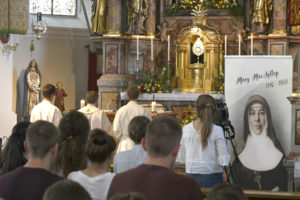 This event coincided with Mary MacKillop’s Feast Day being held from 8 – 11 August in Kundl, Austria. Thirteen years ago, young Catholics from the Austrian state of Tyrol, had the desire to gather together young faithful people at a youth festival. This was the start of an extraordinary journey with incredible graces, which the Lord poured into the hearts of so many of those who attended these meetings. Throughout the years, the fruits have been visible. Some youth have joined the priesthood or religious life, while others found their future spouse and eventually were married. It’s truly amazing how young people continually open their hearts to God and find strength in a new or renewed friendship with Him and also amongst each other.
This event coincided with Mary MacKillop’s Feast Day being held from 8 – 11 August in Kundl, Austria. Thirteen years ago, young Catholics from the Austrian state of Tyrol, had the desire to gather together young faithful people at a youth festival. This was the start of an extraordinary journey with incredible graces, which the Lord poured into the hearts of so many of those who attended these meetings. Throughout the years, the fruits have been visible. Some youth have joined the priesthood or religious life, while others found their future spouse and eventually were married. It’s truly amazing how young people continually open their hearts to God and find strength in a new or renewed friendship with Him and also amongst each other.
The theme of this year’s meeting was taken from the verse Jn: 12,28, “Father, Glorify Your Name.” Approximately 200 young people from Austria, Germany, Switzerland and Slovakia accepted our invitation and traveled to the beautiful little town Kundl, which is surrounded by mountains, to celebrate their faith. Amongst other things, Holy Mass, Adoration, conferences, testimonies, workshops, confession, sports, and the rosary, worked together to create a very special and holy atmosphere. God also blessed us with beautiful summer weather and much joy during this time.
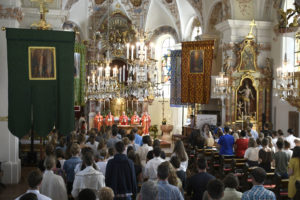
Father Maximilian Maria Schwarzbauer, priest and missionary of the Community “Work of Jesus the High Priest,” spoke in his conferences about the fatherly love of God. His joy was truly contagious. It was no surprise that the resounding round of applause at the end of the meeting seemed to have no end.
Religious sisters of the missionary community “Family of Mary”, helped throughout the meeting with music, workshops and personal talks with the youth. They used their talents and gifts to spread the Good News and helped the young people to deepen their personal relationship with God.
One thing was very obvious at our meeting – we love the saints! During the last of couple years, Sr. Elisa Foidl, wrote seven beautiful musicals, each depicting the life of a different saint, including, Saint Gabriele Possenti, Blessed Charles of Foucauld, and Saint Don Bosco. These musicals were performed by the youth and were attended by adults, other youth, family members and the faithful from local parishes, thus allowing hundreds of people to witness God’s great work in the lives of the saints. The musicals have continued to be a great success.
At the beginning of each New Year, the team organizing the event, randomly draws a patron saint whom they ask to be their patron and intercessor for their summer meeting. This year, as we came together and asked the Lord for our patron saint, we were truly amazed, when we picked Saint Mary MacKillop, as we discovered that her memorial coincided with the first day of our meeting, 8 August. We know this is no coincidence and are so very grateful to God for this sign of His grace and love.
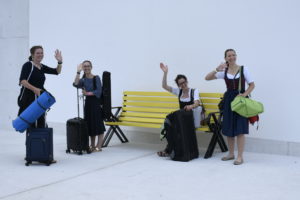
With Saint Mary MacKillop’s homeland being Australia, which is more than 20 hours by plane from our homeland of Austria, it is amazing how this saint has found a place in our hearts. Our two countries not only share similar names, Australia/Austria, but above all, a love and veneration of this truly amazing saint.
We send a big hello to all of you in Australia and unite ourselves with you in prayer, through the intercession of Saint Mary MacKillop.
Barbara Thielen
Member of the organisational team “Liebesiegt”
Photos provided by Sr. Elisa Maria and Sr. Mary Nichole, Apostolic Sisters of the Family of Mary. Used with permission.
Feast of The Exaltation of the Cross
September 14, 2019The Feast of The Exaltation of the Cross – 14 September
I have a friend who exalts the Cross all year round. She is Sr Dorothy Woodward rsj of the Sisters of St Joseph of Lochinvar, NSW. Since 2006 she has painted over 700 crosses for Catholic Schools and Parishes.
A Cross’s significance is carried almost automatically, its shape alone being enough to remind many of Jesus. As the signature marked upon the bodies of the baptised, the Cross holds a sense of Christian belonging for many. It is like a ‘north-south-east-west’ blessing from across God’s universe, “in the name of Father, Son and Spirit”.
A Cross denotes the death and sacrifice of Jesus, executed in consequence of all he had said and done to free people from fear, judgement and exclusion.
For the believer, the Cross proclaims how Jesus accompanies human beings on the ‘crosses’ of their own painful experiences. The Cross shows how, by example, Jesus’ life saves human living from the miseries of selfish, competitive and abusive patterns of power over others. His way of responding to God’s call was authentically human and Godly. His compassionate, merciful, inclusively healing ways of relating with others reveals all that.
The Cross proclaims that his life was not only taken cruelly, but given freely ‘for us’, as he invited others to be ‘at-home’ here on earth and forever with the God he called Abba.
Dorothy’s crosses are not blank. They also carry carefully selected images of human life and meaning-making in particular contexts. They express the fulfilment of Jesus’ promise:
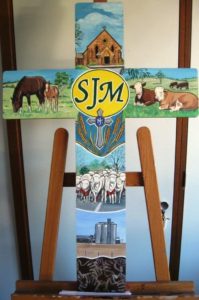 Consider one example, the Cross painted for St Joseph’s School, Merriwa in the Upper Hunter.
Consider one example, the Cross painted for St Joseph’s School, Merriwa in the Upper Hunter.
It pays respect to the Wiradjuri people’s presence on the Land long before the pastoralists settled in the 1820s, and it draws attention to ancient hand-prints still visible near Merriwa. It hints also towards ongoing sorrow for past experiences of inter-cultural pain.
The Cross features St Anne’s Catholic Church built between 1879-81, and the emblem of the Lochinvar Sisters, the founding teachers of St Joseph’s School from 1885, just 2 years after their young Order’s own founding.
Pastoral life is depicted through images of wheat, cattle and sheep farming and horse breeding, all subject to the sometimes-painful rhythm of seasons and fluctuating markets.
Finally, there is an honouring of the community’s joyous annual celebration of itself in the “Festival of the Fleeces” with its unique “running of the sheep” in red socks knitted by willing locals.
Whilst Dorothy’s Crosses do tell of Jesus’ life and death in human history, they also exalt the eternal Christ’s presence in the real circumstances of the here and now, the past and future of people’s lives.
In her artistry, Dorothy gives expression to that famous stance beginning Vatican II’s Pastoral Constitution, The Church in the Modern World:
Virginia M Bourke rsj
Image: The Cross painted by Sr Dorothy Woodward for St Joseph’s School, Merriwa provided by Sr Virginia Bourke. Used with permission.

